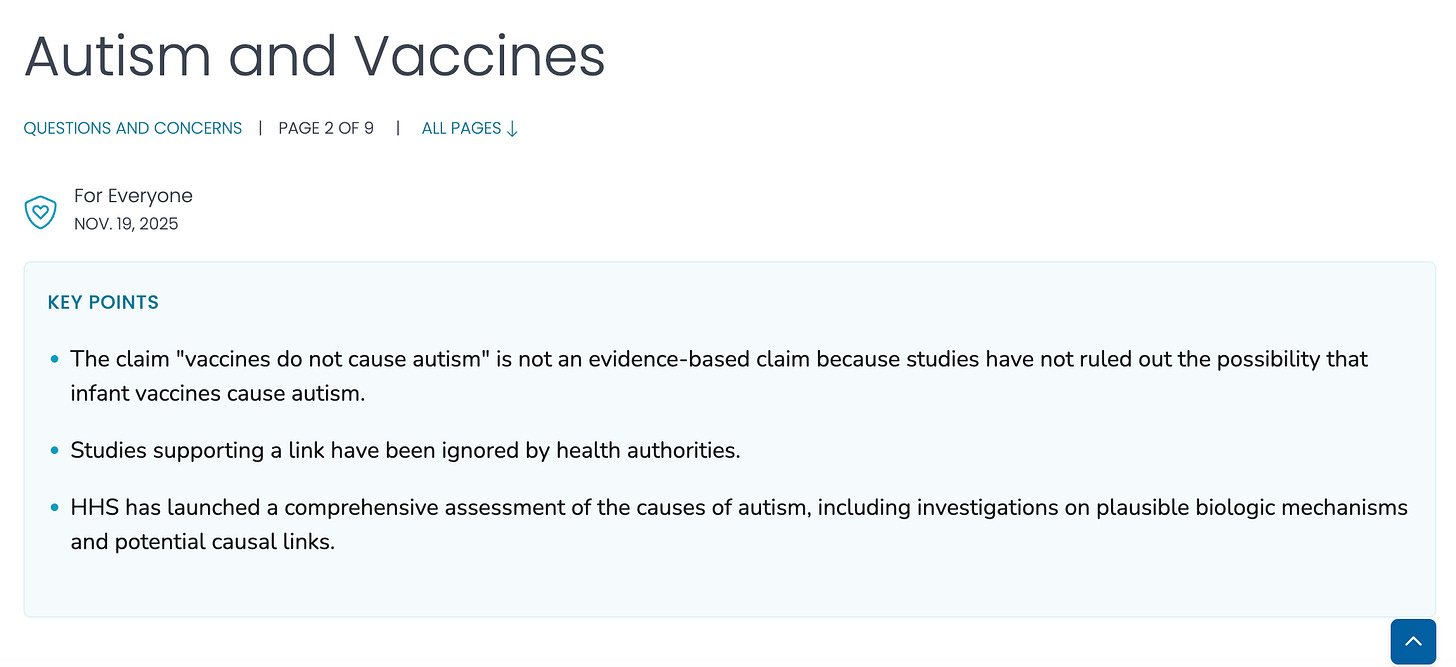CDC’s Autism Reversal Shocks Experts, mRNA Flu Shot Advances, Big Oncology Wins — This Week in Biotech #79
Plus Arrowhead’s first approval, Abbott buys Exact Sciences, Merck bets $9.2B on flu prevention, and fresh takeover buzz in gene editing and IBD (Nov 14-20, 2025).
Hi and welcome to This Week in Biotech by Biotech Blueprint, edition 79, covering biotech & pharma news from November 14th to 20th, 2025.
📣 With the holidays approaching, This Week in Biotech will skip the Nov 28 and Dec 26 editions. Our final issue of the year drops Dec 19, covering the biggest biotech moves of 2025, and we’ll be back Jan 2, 2026 with themes and companies to watch next year.
🌐 Visit our updated website, biotechblueprintconsulting.com, where we’re posting new visuals, reports, and details on our consulting work.
🎙️ Biotech Blueprint brings you weekly video updates on the latest biotech and pharma news, plus in-depth podcast interviews with industry leaders. You can find us on YouTube, Spotify, and Apple Podcasts.
In the latest episode, I sat down with Sensible Biotechnologies’ CEO and principal computational scientist to talk their cell-based mRNA platform and where mRNA goes next.
🔜 Coming up next on Biotech Blueprint: a second time founder who built and sold one biotech to AbbVie and is now taking another into Phase 3. I’ll be sitting down with Dr. Josep Bassaganya-Riera, CEO of NImmune Biopharma, about gut-restricted, tolerance-restoring oral therapies in inflammatory bowel disease, how LANCL2/Treg biology could reshape the treatment sequence, and where AI truly shifts development decisions instead of decorating slide decks.
THIS WEEK IN BIOTECH VIDEO SUMMARY
THIS WEEK’S KEY TAKEAWAYS 🔑
The CDC set off a political and scientific earthquake this week by rewriting its Autism and Vaccines webpage to suggest that the evidence against a vaccine-autism link is “not conclusive,” a reversal that mirrors RFK Jr.’s talking points and jolted career scientists. The update contradicts decades of rigorous data involving millions of children and drew immediate condemnation from the American Academy of Pediatrics and Autism Science Foundation. The episode signals an uncomfortable new reality for public health: federal vaccine messaging is now being openly shaped by political bargaining, just as immunization rates are slipping and measles is making a strong comeback.
On the science and industry side, the contrast couldn’t be sharper. Pfizer delivered one of the clearest validations yet of mRNA flu vaccines, with its shot reducing flu-like illness by 34.5% versus Sanofi’s Fluzone in an 18,000 patient phase 3 and outperforming on the strains that matter most. Meanwhile, Abbott made a $21B move to dominate the $60B U.S. cancer screening market by acquiring Exact Sciences, while Merck paid $9.2B for Cidara to secure a long acting antiviral that could offer season-long flu protection with a single dose.
And oncology delivered genuine clinical steps forward. Amgen’s Imdelltra became the first therapy ever to show a survival advantage in post-platinum small cell lung cancer. Genentech’s giredestrant became the first oral SERD to improve invasive disease-free survival in early ER-positive breast cancer, resetting the endocrine playbook and revaluing the entire SERD landscape. And Jazz/Zymeworks’ Ziihera produced practice-changing results in first-line HER2-positive gastric cancer, outperforming trastuzumab regimens and positioning itself as the likely new standard.
In a week marked by public-health turbulence, the science and clinical data reminded us why biotech remains one of the few sectors capable of producing real, defensible breakthroughs at scale.
BIOTECH/PHARMA NEWS 🧬
🔹 The CDC quietly rewrote its Autism and Vaccines webpage yesterday to say that the claim “vaccines do not cause autism” is not evidence-based, arguing that studies “have not ruled out” a link and that research supporting a connection has been “ignored by health authorities.” This language closely mirrors long-standing talking points from HHS Secretary and anti-vaccine activist RFK Jr. The move directly contradicts decades of high quality data: more than 40 studies across seven countries, involving over 5.6M kids, have consistently found no association between childhood vaccines and autism, as reiterated by the American Academy of Pediatrics and Autism Science Foundation, which condemned the revision as false, dangerous, and likely to fuel vaccine hesitancy just as U.S. childhood coverage is slipping and measles is resurging. Career CDC scientists were reportedly blindsided by the change. Former immunization chief Demetre Daskalakis called it a “national embarrassment” and a “public health emergency,” saying the agency’s scientific voice is being weaponized. An HHS spokesperson defended the update as aligning with “gold-standard, evidence-based science,” while a footnote on the page reveals that the “Vaccines do not cause autism” header was only preserved because of an agreement with Senate HELP Committee chair Bill Cassidy, underscoring how political bargaining is now visibly shaping core federal vaccine messaging.
🔹 Pfizer’s mRNA flu vaccine quietly delivered one of the clearest proof points yet that mRNA may finally break open the sluggish flu vaccine market: in a phase 3 study of 18k adults, the shot cut flu-like illness by 34.5% versus Sanofi’s Fluzone and outperformed on the dominant influenza A strains, according to data in NEJM. Side effects were higher (more arm pain, fatigue, and a modest bump in fevers) but within the expected range for a stronger immune response. Moderna reported a similar win earlier this year in older adults, though Pfizer still missed on influenza B. The catch is politics, not biology: HHS under RFK Jr. has slashed mRNA vaccine funding, blocked several approvals, and cast mRNA as unsafe, raising the risk that the first next-gen flu shots could be scientifically ready but politically stalled.
🔹 Amgen secured full FDA approval for Imdelltra (tarlatamab) in small cell lung cancer, converting last year’s accelerated nod on the strength of the Phase 3 DeLLphi-304 trial. The bispecific DLL3×CD3 engager cut the risk of death by 40% and extended median OS to 13.6 months vs 8.3 months on chemo—making it the first global Phase 3 to show a survival advantage in post-platinum ES-SCLC and cementing its new NCCN Category 1 preferred status. Safety was manageable, with far fewer ≥Grade 3 AEs than chemo and mostly low-grade early CRS. Amgen now pivots to pushing the drug earlier in the disease, where DLL3’s tumor-restricted expression could matter even more.
🔹 Regeneron picked up two major approvals: Libtayo became the first adjuvant immunotherapy for high risk cutaneous squamous cell carcinoma in Europe (C-POST cut recurrence/death 68%), and the FDA expanded Eylea HD to macular edema following retinal vein occlusionwith flexible monthly or q8-week dosing, fortifying both its oncology and retina franchises.
🔹 Abbott is buying Exact Sciences for $105/share ($21B equity value, $23B including debt), adding Cologuard, Oncotype, and its liquid biopsy pipeline to anchor a larger push into the $60B U.S. cancer screening market. The deal closes in 2026 pending approvals and should expand Abbott’s diagnostics footprint.
🔹 Arrowhead won its first FDA approval with Redemplo (plozasiran), a quarterly siRNA for familial chylomicronemia syndrome that cut triglycerides 80% in phase 3 (vs 17% placebo) and reduced pancreatitis risk. The product serves a tiny but highly morbid population and sets up Arrowhead’s entry into commercial RNAi. Redemplo is priced at $60k per year and is going head to head with Ionis’ monthly Tryngolza.
🔹 Genmab and AbbVie scored a big label win as the FDA approved Epkinly (epcoritamab) plus rituximab and lenalidomide (R2) for adults with relapsed or refractory follicular lymphoma, making it the first bispecific-based regimen cleared in the second-line setting and the first bispecific combo ever approved in lymphoma. In the phase 3 EPCORE FL-1 trial, fixed-duration Epkinly + R2 cut the risk of progression or death by 79% versus R2 alone and drove deeper responses, with safety broadly in line with known CRS/ICANS risks captured in a boxed warning.
🔹 Deal chatter in gene editing and IBD: Crispr Therapeutics inched higher after a Betaville “uncooked” alert flagged a potential approach from a large U.S. biopharma ($100–$200B market cap), with Casgevy in sickle cell/TDT plus oncology, cardiovascular, and Type 1 diabetes programs supporting the “speculative strategic asset” vibe more than a fundamentals story. Abivax also popped on renewed takeover rumors tied to its strategic review and whispers AstraZeneca could be circling, on top of the 600% move in July after “best-case” ulcerative colitis data for obefazimod vaulted it to the front of the oral IBD pack and put multi-billion-dollar peak sales firmly in play.
🔹 Merck is buying Cidara for $9.2B to acquire CD388, a long acting, strain-agnostic antiviral now in phase 3 and protected by Breakthrough Therapy status. Early data showed up to 76% protection, making it a potential >$5B opportunity as Merck broadens its respiratory portfolio.
CLINICAL TRIAL UPDATES 📊
🔹 Merck reported an important HIV win with its once-daily two drug pill, doravirine/islatravir, which matched Gilead’s blockbuster Biktarvy in a 537 patient phase 3 trial of treatment-naïve adults. The regimen hit virologic suppression rates (<50 copies/mL at Week 48) on par with Gilead’s three drug combo and delivered comparable tolerability, making it the first non-integrase two drug regimen to go head-to-head with Biktarvy and hold its ground. With an FDA decision already queued up for April 2026, Merck is positioning DOR/ISL as both a switch option for virologically suppressed patients and a clean starting regimen for newly diagnosed individuals, reviving a program that stumbled years ago due to islatravir dosing concerns.
🔹 Agios’ phase 3 RISE UP trial of mitapivat in sickle cell disease hit its hemoglobin response endpoint and showed clear anti-hemolytic effects, but failed to significantly reduce annual pain crises or improve fatigue on PROMIS, triggering a 50% share selloff even as the company plans an FDA filing in 2026 and cost cuts to focus on the upcoming thalassemia launch.
🔹 Vanda posted a strong phase 2 win with tradipitant, showing the NK-1 antagonist can cut Wegovy-induced vomiting nearly in half, a compelling angle in a GLP-1 market where 30-50% of patients abandon therapy early because of GI side effects. In a 116 person study, vomiting occurred in 29% of tradipitant patients versus 59% on placebo, with similar reductions in combined nausea/vomiting. Safety looked clean and consistent with prior experience, and Vanda now plans to launch a phase 3 program in early 2026. With GLP-1s powering a $50B+ global market and payors grappling with high discontinuation rates and wasted spend, an adjunct that enables faster titration and sustained adherence could be commercially meaningful. Shares jumped double digits on the news.
🔹 Genentech’s oral selective estrogen receptor degrader (SERD) giredestrant became the first in its class to significantly improve invasive disease-free survival in early ER-positive breast cancer, hitting the primary endpoint in the 4,100 patient phase 3 lidERA trial with a clean safety profile and early overall survival benefit. Coupled with the positive metastatic evERA data, giredestrant now looks like a new endocrine backbone across the ER+ continuum, sending Roche shares higher and doubling Olema’s stock as investors reassessed the entire SERD landscape.
🔹 Jazz and Zymeworks’ Ziihera delivered a phase 3 win in first line HER2-positive gastric cancer, beating trastuzumab regimens on progression-free survival and showing an early overall survival advantage, with the triplet arm performing even better. Jazz now moves toward filings as investors re-rate the asset.
Have a great rest of your week and thanks for reading Biotech Blueprint!





